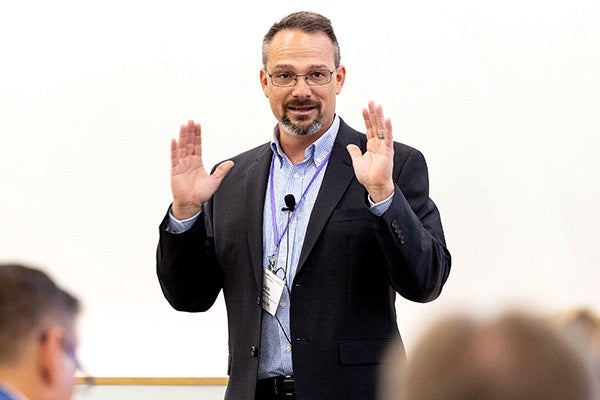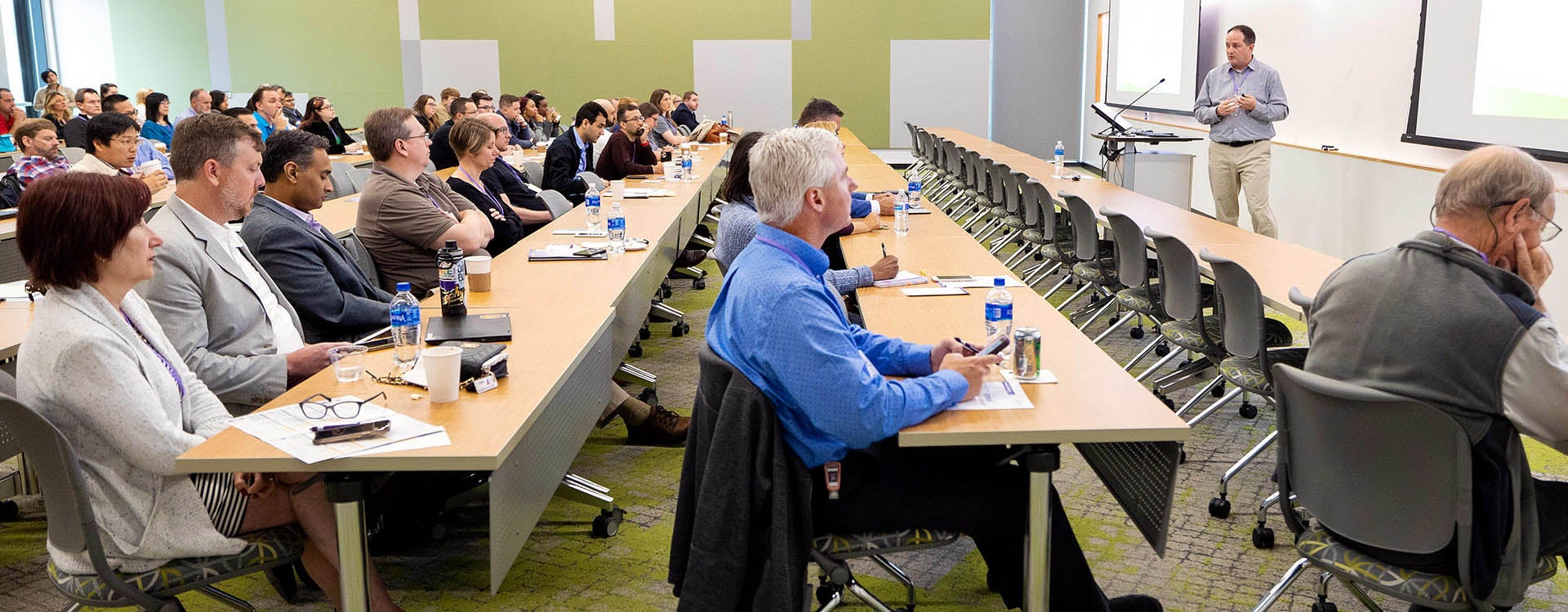Growing pharmaceutical industry focus of conference at ECU
Against the backdrop of a growing pharmaceutical industry in eastern North Carolina, East Carolina University and the Eastern Region Pharma Center hosted its annual Spring Pharma Conference on Tuesday and Wednesday.
More than 100 industry professionals representing 31 pharmaceutical and life sciences companies and organizations from Wilmington to the Triangle and all points in between gathered at ECU’s Life Sciences and Biotechnology Building for the two-day conference.

Dr. Jack Pender, director of pharmaceutical training and laboratory services in the Department of Chemistry, welcomes attendees to the ECU Spring Pharma Conference. (Photos by Rhett Butler)
The goal was to provide information on everything from safety to U.S. Food and Drug Administration regulations.
“Anytime you can learn something new and different, you go do it,” said Michael DeHart, director of product development at CMP Pharma in Farmville.
DeHart not only attended, but also was one of 19 speakers to present at either general or breakout sessions that made up the conference. Those sessions focused on topics such as regulatory expectations, quality control, technology and innovation, and project management and planning.
Dr. Jack Pender, director of pharmaceutical training and laboratory services in the ECU Department of Chemistry, organized the conference with support from ECU’s Office of Continuing and Professional Education. He said the purpose was to provide industry professionals a wealth of information without having to travel to large national conferences in places like San Diego or Atlanta.
“These conferences cost so much that if a company was going to send someone, it would be one or two people at most,” Pender said. “Most people wouldn’t get a chance to do that, so let’s put something here in eastern North Carolina, here at ECU where we are becoming a central hub for pharma education and where we are trying to promote the pharma community here.”
He said he hoped those attending the sold-out event gained perspective.
“Of course we want them to gain new knowledge, but we also hope they can confirm things they already knew,” Pender said. “I find that to be very helpful when I think I might know something and someone says the same thing, then I know it’s right. Also, if they say something different, that gives me something to think about.”
The event also featured vendors, networking opportunities, and a welcome reception and was managed by ECU’s Office of Continuing and Professional Education.

Participants at ECU’s Spring Pharma Conference listen to a presentation at the Life Sciences and Biotechnology Building.
“When you talk to people from other companies, you get to hear how they do it at their companies, and that helps with perspective, that the way we’re doing it is on par with what industry is doing, or that we’re well advanced or maybe we have some catching up to do,” Pender said.
The conference also allowed Pender to talk about the Eastern Region Pharma Center, which is housed in the Life Sciences and Biotechnology Building. The center, which is supported through funding from the Golden Leaf Foundation and the university, is working with 15 pharmaceutical companies and five regional community colleges to be a leader in workforce development for the growing industry.
North Carolina has seen roughly 9,600 new biotechnology jobs in the last two years, according to the North Carolina Biotechnology Center. North Carolina is the third largest state in the nation for biopharma jobs.
ECU programs such as the bioprocess engineering concentration are designed to graduate students who can fill those jobs.
“We’re trying to make sure that students are aware of the opportunities that are available in pharma,” Pender said. “A lot of them are already going to these companies with their regular degrees, and they are having to start at ground zero. We’re adding some pharma flavor to the programs we already have. Chemistry has been doing it and engineering has been doing it, and we’re just trying to add to it to feed people into these companies who are more prepared than if they hadn’t had this. That’s our mission.”
DeHart put the job growth in the pharmaceutical industry in perspective.
“You can throw a rock and hit a pharmaceutical company around here. It’s crazy,” he said.
He said the industry employs people in a variety of jobs, from quality control and research personnel to equipment operators and project managers. And though originally from Kentucky, he’s happy to see those jobs available in eastern North Carolina.
“I’m a big fan of organic growth, of localization,” DeHart said. “I want to see the area succeed. There are so many companies here, let’s foster that organic growth. … Right now, there’s high demand (for jobs), and it’s great that places like Pitt Community College and ECU are trying to meet that demand, but not only just meet demand but provide value, to provide people the right skillsets so they will be successful. I think that’s so critical. Now that I’m here in eastern North Carolina, I want to see it be successful because it helps everyone.”

Michael DeHart, director of product development at CMP Pharma in Farmville, presents a program on the role of lab analysts during the ECU Spring Pharma Conference.